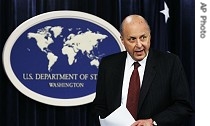2007年VOA标准英语-US Officials Say Sudan Sanctions Will Have Seri
搜索关注在线英语听力室公众号:tingroom,领取免费英语资料大礼包。
(单词翻译)
By David GollustWashington
29 May 2007
Top Bush administration officials said Tuesday President Bush decided1 to seek new sanctions against Sudan in the face of continued stalling by Khartoum on an upgraded peacekeeping force for Darfur. They say the effect on Sudan's economy of the new U.S. financial penalties will be very serious. VOA's David Gollust reports from the State Department.
 |
| John Negroponte |
"The Sudanese government has shown what it does with more time. According to a United Nations report on May 3, for example, the government of Sudan used Antonov bombers4 to attack the village of al-Hash for four hours. This credible5 report and many others demonstrates that giving Khartoum more time is not the answer," he said.
The new U.S. economic sanctions target two senior Sudanese government officials, a Darfur rebel leader, 30 companies owned or controlled by the Khartoum government, and one company that violated the U.N. arms embargo6 in Darfur by shipping7 weapons to the region. Of the 30 companies, five are key players in the country's growing oil and gas industry.
The director of the U.S. Treasury8 Department's Office of Foreign Assets Control, Adam Szubin, said it is unclear how many, if any, assets of those companies are held by U.S. banks and are now frozen. But he said, given the United States' pivotal role in the oil and gas industry world-wide, effectively barring those firms from the U.S. financial system will have a severe impact on their operations.
"The impact is not just in terms of what may be in the United States today or what may be sitting in a bank account, but also on transactions that could be coming in tomorrow or the weeks to come. The U.S. financial system is obviously a key node in the international financial system, both in terms of trade and financials transfers. And that fact, that these companies are basically excommunicated from the U.S. financial system, is very serious," he said.
Though it nominally9 accepted a new peacekeeping presence for Darfur at an international conference in Addis Ababa last November, officials here say Sudan has used delaying tactics at every turn to block the envisaged10 "hybrid11" force of United Nations and African Union troops.
The hybrid force of about 23,000 troops is to replace the 7,000 member African Union observer mission in Darfur, which has been in place since late 2004 but has been financially strapped12 and unable to deter13 violence in the vast region.
U.S. special envoy14 for Sudan Andrew Natsios says that by resisting the two phases of logistical preparations for the new force, Sudan has effectively been blocking U.N. troop recruitment efforts.
Natsios says governments are understandably reluctant to commit forces against the will of the host country. "No country is going to agree to anything under phase three until there is some agreement by the Sudanese government that they're going to allow them in. Once that happens, once the Sudanese government has agreed to the U.N.-AU operational plan under phase three, the hybrid as it's called, then an appeal will go out from the Secretary-General to nations, potential troop contributing countries," he said.
Natsios said President Bush and Secretary of State Condoleezza Rice have been canvassing15 world leaders on contributing forces and that Pakistan, Nigeria, Egypt, Norway and Sweden have expressed a willingness to be part of the "phase-two" deployment16 of about 3,000 combat engineers, airlift, and other logistical forces.
He said several countries have informally offered to be part of the "phase-three" main deployment including Rwanda which is offering two combat battalions17. But he said there will be no formal offers until the Khartoum government gives its assent18 to the entire plan.
Natsios said a U.S. role in the Darfur force, even if U.S. troops were not already committed in Iraq and Afghanistan, would be inadvisable since Sudanese President Omar el-Bashir has used the prospect19 of western troops in Darfur as a rallying cry against the U.N. plan.
 收听单词发音
收听单词发音 




